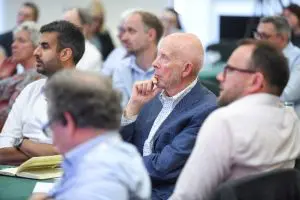Fostering a future-ready workforce through collaboration
Posted on: 24 October, 2024
Rapid technological advancements, net zero commitments and the need for robust safety reforms are putting new demands on the built environment sector’s human capital. UCEM’s latest report, ‘Collaborative Futures: Competence, Capability & Capacity’, takes on this issue by outlining a framework for cultivating a skilled, adaptable and resilient workforce. The report, released following UCEM’s recent INSPIRE event, brings together insights from leaders across the sector and highlights the critical importance of cross-sector collaboration in addressing these challenges.
 The report presents the outcomes of discussions held at UCEM’s recent ‘INSPIRE’ event, co-hosted with the Construction Industry Council, Supply Chain Sustainability School, Construction Leadership Council, Technical Apprenticeship Consortium and the Edge. The event aimed to share innovative strategies and best practices for educating and upskilling the sector’s workforce to ensure competence, increase capacity and enhance capability.
The report presents the outcomes of discussions held at UCEM’s recent ‘INSPIRE’ event, co-hosted with the Construction Industry Council, Supply Chain Sustainability School, Construction Leadership Council, Technical Apprenticeship Consortium and the Edge. The event aimed to share innovative strategies and best practices for educating and upskilling the sector’s workforce to ensure competence, increase capacity and enhance capability.
It saw over 80 attendees from built environment organisations such as AECOM, Atkins Realis, BAM Nuttall, Building Research Executive, British Standards Institution, Build UK, CIOB, CITB, City & Guilds, Department for Business and Trade, Department for Education, Home Builders Federation, Kier, NHBC, RICS, RTPI, Valuation Office Agency and UCL, amongst many others.
Partnership to drive change
With partnership working as its core theme, the report emphasises that no single organisation can address the sector’s challenges in isolation. Instead, the report calls for interdisciplinary collaboration, where professional bodies, government, educators and industry work together to strengthen the workforce.
This collective approach is necessary to meet growing demands for workforce professionalism, especially in light of the post-Grenfell era, where safety and competence are paramount. Nick Roberts, People & Skills Industry Sponsor for the Construction Leadership Council, echoes this sentiment in the report’s Foreword: “Competence must become a routine aspect of working life no matter the occupation level or role – regulatory, professional, technical, onsite, and off.”
Key focus areas for workforce development
The ‘Collaborative Futures…’ report has five key takeaways:
- Fostering interdisciplinary collaboration: Working across the sector and between specialisms is essential for addressing skills shortages, ensuring best practices are shared and maintaining high standards in quality and safety.
- Combating ‘Competence Inflation’: The industry must avoid promoting individuals beyond their skill levels and focus on continuous professional development to align employees’ competencies with their roles and responsibilities.
- Enhancing professional and technical qualifications: Competencies such as digital proficiency, project management and financial awareness should be introduced earlier in education and then certified through technical qualifications, apprenticeships and mandatory CPD.
- Leveraging technology for skills development: AI and digital technologies have the potential to transform construction processes, but training and education must ensure workers are equipped to effectively integrate these technologies into their activities, with the sector
- Creating inclusive talent pathways: The sector must leverage the potential of non-traditional talent pools, such as veterans, career changers and disadvantaged groups, providing flexible training and clear progression routes to help address the skills gap, particularly for data and AI specialists.
The ‘Collaborative Futures…’ report underscores the urgent need for unified action within the built environment sector. The challenges are significant, whether it’s preparing for net zero, adapting to technological advancements, or ensuring robust safety standards, but the solutions are within reach. By fostering collaboration, upskilling the workforce and creating inclusive pathways, the sector can develop the competence, capability and capacity required for long-term success.
 Read the report and recommendations in full: ‘Collaborative Futures: Competence, Capability & Capacity’ report is available now.
Read the report and recommendations in full: ‘Collaborative Futures: Competence, Capability & Capacity’ report is available now.
Welcoming the report, Ashley Wheaton, UCEM’s Vice Chancellor, said “The built environment sector stands at a pivotal juncture, facing challenges that can only be overcome through unified action and interdisciplinary collaboration. UCEM is committed to leading the way in fostering partnerships that will develop a skilled, adaptable workforce ready to meet the demands of the future.”





